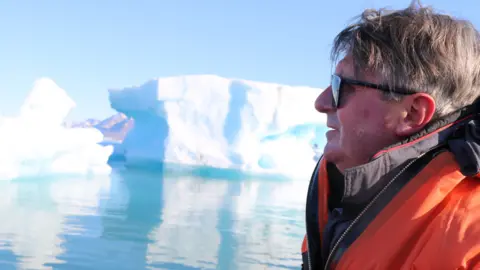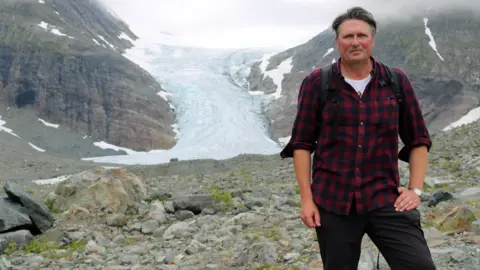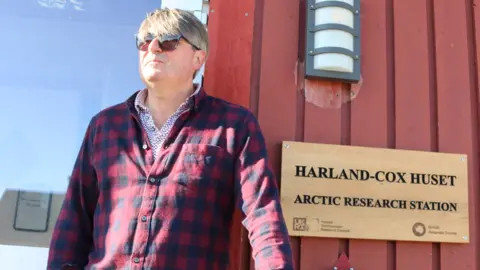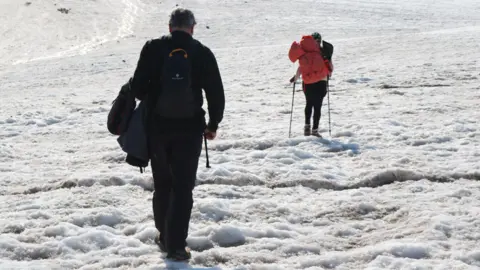Simon Armitage: Poet laureate on 'life-changing' visit to the Arctic
 BBC
BBCAfter a "life-changing" visit to the Arctic, poet laureate Simon Armitage says poets can convey what's happening with climate change in a way that scientists and journalists can't.
A polar bear is traipsing over a receding glacier that now resembles a "rotting carcass of ice", wearing a fur coat that's "too heavy, too baggy, too hot since the sun got stuck in the sky".
In Armitage's poem Polar Bear, the writer goes on to imagine the animal he spotted on his visit being destined to roam in ever narrower circles in search of scarcer food, until all it can do is reach up for the North Star and "cling by a single claw".
In another work, Armitage describes his boat drifting through the remains of an "ancient empire of snow" that appears to have been smashed to ruins, leaving the "marbled wreckage" of imagined icy temples, palaces and tombs.
A third poem is inspired by a conversation with a scientist who is researching seabirds whose stomachs contain pieces of plastic from around the world.
"In the small intestine/of the little auk/we found Mexico City, Manila, Shanghai, New York."

As well as his poems, Armitage has made a BBC Radio 4 series about the trip. In the first episode, he says poets have had their "money's worth when it comes to nature" by using it as inspiration for centuries, and it's "time for poetry to pay something back".
He explains: "It's occurred to me recently that we are doing terrible damage to the planet, and the planet can't speak up for itself. It doesn't have an articulate voice in that way.
"And I started to think that that might be part of the role of the poet in the contemporary age - to speak up for nature, rather than just use it in a poem."
When Armitage was chosen as poet laureate in 2019, he said he wanted to put a focus on the climate.
His interest in the environment goes back further - he studied geography at Portsmouth Polytechnic in the 1980s. Back then, "climate change was barely there as a topic", he says.
"I don't remember that phrase coming up very often, and it certainly wasn't part of my study.
"But it's everything now - everything that was being observed and documented and recorded and measured by all the scientists in that place [the Arctic]. It dominates their thinking."

Armitage spent about a week in July on the Norwegian archipelago of Svalbard, home to the world's most northerly permanent settlement and the UK Arctic Research Station. The region is warming much faster than the global average.
What surprised him most? That answer is very easy, he says. "It was very warm."
The thermal clothes he was advised to pack stayed in his suitcase as the temperature hovered around 11C for four or five days.
"In some ways it was incredibly fortunate to have that kind of stillness, calmness, visibility - just to be able to see so clearly its incredibly breathtaking beauty."
But it was a "weird beauty", he continues.
"You're seeing things you probably shouldn't be able to see - the sides of mountains which, up until recently, were covered in glacial ice; the insides of the glaciers as the front end is carving off; islands appearing which they thought were parts of the mainland; lakes forming at the front of glaciers which were never there on the maps before.
"Literally, the maps are changing. So [it has] this very unstable and literally fluid geography, which tests your belief in the stability of the world and the planet."
Seeing the effects of climate change for himself was "a life-changing experience" and made him come to the conclusion that the planet as we have traditionally thought about it "doesn't exist any more".
"It exists in pockets and patches," he says. "But it's not there any more. It's a kind of fiction. That's this really heavy sense that I've come back with, or it's some kind of awakening to a situation."
He doesn't want to sound gloomy, he stresses. "But I felt as if I were writing elegies, actually."

We already hear a lot about climate change, of course. And in the introduction to the pamphlet containing his Arctic poems, Armitage admits poetry "is hardly the mass communication tool to overcome the world's selected deafness".
But he holds out hope that literature can be more persuasive than news reports or scientific data. And, approaching the halfway point in his 10-year tenure as poet laureate, Armitage has a bigger platform than most.
"Part of the project was to come back and talk about this stuff, maybe in a slightly different language - in artistic terms - because scientists, by their own admission, don't always have the have the language to convey [it], or facts and figures aren't often what people want to want to hear."
While scientists and journalists normally try to maintain some objectivity, poets are free to make full use of literary devices like metaphors.
"When you use one effectively, people don't just understand the comparison, they actually experience it," Armitage says.
"For example, I heard some of the scientists talking about how a lot of the glaciers were ill or sick. I think when they use those words, they know they are slightly overstepping the mark. They've entered a territory of language which is subjective.
"But I'm all about the subjective, so I try to take that a little bit further.
"In one of the poems, I refer to the glacier as a carcass. And if I'm trusting my own work, I feel as if that hits home."
Poet Laureate in the Arctic is on Radio 4 on Tuesdays at 11:30 BST, and on BBC Sounds. The Cryosphere by Simon Armitage is published by Faber.
